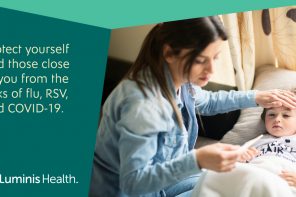In the fall and winter, staying vigilant about our health becomes paramount during the peak of respiratory illness season. During this period, the convergence of various respiratory infections, such as the flu, COVID-19 and RSV, underscores the importance of knowing how to prevent the spread of germs and maintaining robust health practices. Through vaccination and rigorous hygiene measures, we can strengthen our defenses against these illnesses.
Who’s at Risk
Flu, RSV, and SARs CoV2 which causes COVID-19 disease are all viruses. High risk groups for all three viruses include, but aren’t limited to, adults over 65, very young children and those with chronic conditions such as asthma, heart disease, neurologic issues, weakened immune systems and obesity. Women who are pregnant may also be at risk.
About Vaccination
Flu vaccines are available, so get yours, sooner rather than later. It takes two weeks for antibodies to be effective. The Centers for Disease Control and Prevention (CDC) recommends everyone six months and older receive a flu vaccine each year, with rare exceptions. Vaccination is particularly important during pregnancy and for those at higher risk of serious complications such as pneumonia and even death. Flu can also cause problems that may result in inflammation of the heart, brain, muscle tissues, and multi-organ failure.
The CDC recommends that everyone five years and older receive one dose of the updated COVID-19 omicron-specific booster, even if you had the original series. RSV vaccines are recommended for adults 60 years and older and pregnant women. There is also an RSV antibody shot that is recommended for babies at birth to 8 months old, but has been difficult for many health care providers to get adequate supply this season. RSV can inflame the small airways of the lungs or cause pneumonia—which is a lung infection—in children younger than one year.
What You Can Do
You’ve heard this before, but truthfully, these are the best ways to protect yourself from serious respiratory illness:
- Wash your hands often.
- Keep your hands off your face.
- Avoid close contact with sick people.
- Cover your coughs and sneezes.
- Clean and disinfect surfaces.
- Stay home when you are sick.
In addition, experts agree that vaccination will keep you from being hospitalized for severe illness and keep you home with family this holiday season.
 Jean Murray is the system director of Infection Prevention and Epidemiology at Luminis Health. She has over 26 years of experience in infection control, outbreak surveillance and epidemiology.
Jean Murray is the system director of Infection Prevention and Epidemiology at Luminis Health. She has over 26 years of experience in infection control, outbreak surveillance and epidemiology.


